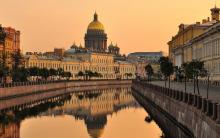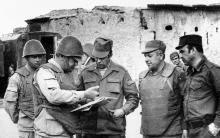Dubynin Viktor Petrovich
(01.02.1943 - 22.11.1992)
Born on February 1, 1943 in the village of Bolshaya Riga, Shumikha district, Kurgan region.
In the Soviet Army since 1961. In 1964 he graduated from the Far Eastern Tank School in the city of Blagoveshchensk, Amur Region. He began his officer service as a commander of a training tank platoon, moving up the ranks to the position of commander of a tank division, graduating from the Military Academy of Armored Forces in 1978.
After graduating from the Military Academy of the General Staff of the USSR Armed Forces in 1984, General Dubynin V.P. - 1st deputy, and then from April 30, 1986 to June 1, 1987 - commander of the 40th Army of the Turkestan Military District. He skillfully directed its actions in a combat situation in the Democratic Republic of Afghanistan. And upon returning to his homeland, he commanded the 7th Guards Tank Army in the Belarusian Military District (the city of Borisov, Minsk region). In May 1988 - June 1989 - chief of staff - first deputy commander of the Kyiv Military District. Since June 1989 - Commander of the Northern Group of Forces.
After the collapse of the Soviet Union, when the Armed Forces of the Russian Federation were created in May 1992, by Decree of the President of the Russian Federation of June 10, 1992 No. 613, Colonel General Viktor Petrovich Dubynin was appointed Chief of the General Staff of the Armed Forces - First Deputy Minister of Defense of the Russian Federation.
In this high and responsible position, he, together with like-minded people, managed to clearly formulate and defend Russia’s nuclear policy and strategy, justify the importance of financing programs for the development of the Navy, and resolve other important issues of Russian defense.
November 19, 1992 to Colonel General Dubynin V.P. awarded the highest military rank of "Army General".
But a merciless serious illness did not allow the courageous Man, Soldier, General, Patriot to continue the noble mission of restoring the defense potential of the Fatherland: November 22, 1992, Army General V.P. Dubynin. died. He was buried in the hero city of Moscow at the Novodevichy cemetery.
By Decree of the President of the Russian Federation of November 11, 2003, for demonstrated personal courage and skillful leadership of troops, to the Army General Dubynin Viktor Petrovich awarded posthumously title of Hero of the Russian Federation.
Awarded the Order of the Red Banner, "For Service to the Motherland in the Armed Forces of the USSR" 2nd and 3rd degrees, medals, foreign awards.
In the Hero’s homeland, in the village of Bolshaya Riga, Shumikha district, Kurgan region, a museum was opened in memory of the glorious fellow countryman. His name, by order of the Government of the Russian Federation dated September 17, 2003 No. 1350-r, was assigned to the Military Automotive Institute, which from that time has been called: “Ryazan Military Automotive Institute named after Army General V.P. Dubynin.”
Viktor Petrovich Dubynin(February 1, 1943, urban-type settlement Martyush, Kamensky district, Sverdlovsk region - November 22, 1992, Moscow) - Soviet and Russian military leader. 1st Chief of the General Staff of the Armed Forces of the Russian Federation - First Deputy Minister of Defense of the Russian Federation (May - November 1992), Commander of the 40th Army (1986-1987), Army General (1992). Hero of the Russian Federation (November 11, 2003, posthumously).
Biography
Viktor Petrovich Dubynin was born on February 1, 1943 in the town of Martyush, Kamensky district, Sverdlovsk region. His parents' family was exiled there in 1937. In 1946 or 1948, they were able to return to their native village of Bolshaya Riga, Riga village council, Galkinsky district, Kurgan region (since February 1, 1963, a village in the Shumikha district).
Since 1951, he studied in the old school building in the village. Greater Riga. He graduated from the 9th grade, and the school was transferred to an eight-year education. Soon an evening 10th grade was created, closed in April 1961. Dubynin received his certificate in the village of Galkino.
Military service in the USSR
In the Soviet Army since 1961. He graduated from the Far Eastern Tank School in the city of Blagoveshchensk (Amur Region) (1964). He commanded a training tank platoon of a training tank regiment of a guards training tank division, stationed in the city of Pechi, near Borisov, Belarusian SSR. Since 1970 - commander of a tank company. Since October 1971 - commander of a tank battalion of the 32nd tank regiment of the 29th tank division.
In 1973 he graduated from the Higher Officer Course “Vystrel” named after Marshal of the Soviet Union B. M. Shaposhnikov in Moscow. In 1974 he entered and in 1978 graduated in absentia from the Military Academy of Armored Forces named after R. Ya. Malinovsky. Since August 1975 - Chief of Staff - Deputy Commander of the 93rd Guards Tank Regiment. Since 1976 - commander of the 32nd Tank Regiment. Then - deputy division commander, and from 1979 to 1982 - commander of the 8th Guards Tank Division in the Belarusian Military District.
In 1984 he graduated from the Military Academy of the General Staff of the USSR Armed Forces named after K.E. Voroshilov and was appointed to the post of first deputy commander of the 32nd Army in Kazakhstan. And in September of the same year, a new order followed - to the post of deputy commander of the 40th Army.
Afghan war
From September 1984 - deputy commander, and from April 30, 1986 to June 1, 1987 - commander of the 40th combined arms army of the Turkestan Military District. The troops of this army made up the bulk of the Limited contingent of Soviet troops in Afghanistan. As army commander, Dubynin planned and carried out the main combat operations of the Soviet troops. In the context of the partial withdrawal of Soviet troops from Afghanistan, Dubynin revised the tactics of the Soviet troops, moving from continuous military operations throughout the country to successive carefully prepared combat operations to destroy key strongholds of the Mujahideen. Each such operation caused significant damage to the enemy and led to the cessation or significant weakening of the partisan movement in the regions for several months. He knew how to fight with little blood. During the year of his command of the army, the number of irretrievable losses decreased by 2 times (compared to 1984-1985).
Assessing V.P. Dubynin’s attitude towards the soldier and his desire to minimize losses, Secretary of the Security Council of the Russian Federation A.A. Kokoshin put General Dubynin on a par with such commanders of the Great Patriotic War as Marshal of the Soviet Union K.K. Rokossovsky and Army General I. E. Petrov.
Last years
Since June 1987 - commander of the 7th Tank Army in the Belarusian Military District (Borisov). Since May 1988 - Chief of Staff - First Deputy Commander of the Kyiv Military District. Since June 1989 - commander of the Northern Group of Forces on the territory of Poland, in the difficult conditions of the crisis of power in the USSR, he managed to carry out its organized withdrawal from Poland to the Tver region.
;
General Staff of the Russian Armed Forces
| 21px | |||
| Order of the Red Banner | Order of the Red Star | II degree | Order "For Service to the Motherland in the Armed Forces of the USSR" III degree |
| Jubilee medal “For valiant labor (For military valor). In commemoration of the 100th anniversary of the birth of Vladimir Ilyich Lenin" | 40px | 40px | 40px |
| 40px | 40px | 40px | I degree |
| Medal "For Impeccable Service" II degree | Medal "For Impeccable Service" III degree | 40px | 40px |
Lua error in Module:Wikidata on line 170: attempt to index field "wikibase" (a nil value).
Lua error in Module:Wikidata on line 170: attempt to index field "wikibase" (a nil value).
Lua error in Module:Wikidata on line 170: attempt to index field "wikibase" (a nil value).
Viktor Petrovich Dubynin(February 1, town Martyush, Kamensky district, Sverdlovsk region - November 22, Moscow) - Soviet and Russian military leader. 1st Chief of the General Staff of the Armed Forces of the Russian Federation - First Deputy Minister of Defense of the Russian Federation (May - November 1992), Commander of the 40th Army (1986-1987), Army General (1992). Hero of the Russian Federation (November 11, posthumously).
Biography
Viktor Petrovich Dubynin was born on February 1, 1943 in the town of Martyush, Kamensky district, Sverdlovsk region. His parents' family was exiled there in 1937. In 1946 or 1948, they were able to return to their native village of Bolshaya Riga, Riga village council, Galkinsky district, Kurgan region (since February 1, 1963, a village in the Shumikha district).
Assessing V.P. Dubynin’s attitude towards the soldier and his desire to minimize losses, Secretary of the Security Council of the Russian Federation A.A. Kokoshin put General Dubynin on a par with such commanders of the Great Patriotic War as Marshal of the Soviet Union K.K. Rokossovsky and Army General I. E. Petrov.
Last years
Memory
Error creating thumbnail: File not found
Monument at Novodevichy Cemetery in Moscow
Awards
- Hero of the Russian Federation (November 11) - for demonstrated personal courage and skillful leadership of troops during combat operations in Afghanistan(posthumously)
- The Gold Star medal No. 803 was awarded to the Hero’s family.
- Order of the Red Banner, 1985
- Order of the Red Star, 1990
- Order "For Service to the Motherland in the Armed Forces of the USSR" II degree, 1981
- Order "For Service to the Motherland in the Armed Forces of the USSR" III degree, 1978
- Medals, including:
- Jubilee medal “For military valor. In commemoration of the 100th anniversary of the birth of Vladimir Ilyich Lenin"
- Medal "For Impeccable Service" 1st class
- Medal "For Impeccable Service" II degree
- Medal "For Impeccable Service" III degree
- Foreign awards
- Honorary citizen of the city of Kamensk-Uralsky, 2013
Military ranks
- major (February 1973, early)
- Major General (December 1982)
- Lieutenant General (May 1987)
- Colonel General (06/30/1990)
- Army General (10/5/1992)
Family
- Grandfather - Sergei Dubynin, dispossessed in 1930
- Father - Pyotr Sergeevich (died in 1969), moved in 1937 to the town of Martyush, worked at a defense plant, returned to the village. Greater Riga
- Mother - Irina Ivanovna Legotina, worked in a bakery
- Brother (from his father’s first marriage) - Leonid (born 1923), went to Volkhov
- Brother (from his father’s first marriage) - Nikolai (born 1927), worked as a salesman in a store in the village. Greater Riga
- Sister (from her mother’s first marriage) - Nina Mikhailovna (d. November 22, 1994), married to military officer-pilot Alexander Ivanovich Fartygin
- Brother - Vladimir (1938 - November 22, 2003), worked in the village. Greater Riga as a foreman, then as a foreman of an integrated brigade, chairman of the village council, chairman of the general store
- Brother - Yuri (b. 1949), disabled since childhood, mastered sewing
- Wife - Lyudmila Vasilievna (b. 1948).
- Son - Yuri, graduated from the Chelyabinsk Higher Tank Command School. He rose to the rank of major. But in the 1990s he left the Armed Forces
- Daughter - Tatyana graduated from a military law school and defended her Ph.D. thesis
Write a review of the article "Dubynin, Viktor Petrovich"
Notes
Literature
- Military encyclopedia in 8 volumes. Publishing house of the Ministry of Defense of the Russian Federation. Moscow, 1994-2002. Volume 3.
Documentary
Links
Viktor Dubynin was born on February 1, 1943. He became the first chief of the General Staff of the Russian Armed Forces and the third person in the country to be awarded the military rank of “army general.” The decree of the President of the Russian Federation on assigning the next military rank to Colonel General Viktor Dubynin was signed while he was in the hospital. On November 19, 1992, Minister of Defense Pavel Grachev, in the hospital ward, handed his subordinate shoulder straps and helped him put on a ceremonial jacket specially sewn on his orders. And three days later, the first Chief of the General Staff died, a little more than two months short of his 50th birthday.
Grachev later admits that if it weren’t for Viktor Petrovich’s cancer, which consumed him in just a few weeks, he would have persuaded Yeltsin to swap them. Pavel Sergeevich understood perfectly well that in terms of his intellectual level, leadership abilities, and most importantly, his authority among the troops at that time in the army, Viktor Dubynin had no equal. “Commanders like him,” the minister said during the general’s lifetime, “are born once every hundred years.”
According to the unspoken laws of Soviet times, Dubynin should not have become a general. Born in a special settlement - one of the islands of the huge “Gulag archipelago”, where his father, an “enemy of the people”, served his sentence; and later, having moved to the Trans-Urals, the boy did not even suspect what interest he would be for the competent authorities. Their long arms began to reach him after he entered the Far Eastern Tank School.
Several times, at the request of military special officers, he had to write explanatory notes on various occasions. And even when his father died, for a long time he felt the breath of these same organs behind his back.
Throughout his service, Victor was distinguished by his intelligence. No one had ever heard him swear. Moreover, he raised his voice so rarely that some simply wondered how this man could command. Under any circumstances, Dubynin kept himself in control. Only when he was very worried did his voice change intonation and he began to burr slightly. And he also smoked a lot, believing that it calmed him down. But how he commanded! Of all the commanders of the 40th Army in Afghanistan (there were seven of them, strictly classified generals), it was Dubynin who was remembered more than others for his eccentricity.

He seriously declared himself while still being deputy commander. The first task that Victor set for his subordinates after arriving in Afghanistan was to stop lying. We were talking about reports to Moscow regarding the number of killed and wounded.
Now it is no longer a secret that the true figures were then stretched out over several days, so as not to provoke the wrath of high authorities. Dubynin began to report the true losses, despite the fact that this radically changed the statistics. This was also due to the fact that only in 1985 the Soviet government decided to pay soldiers for injuries.
And Viktor Petrovich was the first to take it upon himself to voice the figure to the state - 44 thousand wounded. He guaranteed his subordinates that he took full responsibility for this truth. But the number of those killed under him decreased by one and a half times. And not on paper, but in fact. During his service in the Islamic Republic of Afghanistan (instead of the required two years, his deployment to the war lasted three and a half years) Dubynin conducted the largest number of combat operations with a minimum of losses.
It was under him that a new principle of combining radio intelligence and firepower into one fist was tested, which made it possible to disable the entire enemy control system. He also introduced new tactics for using helicopters during landings. It was under the leadership of Dubynin that, for the first time in world practice, our paratroopers began to land in the mountains not using parachutes, but simply jumping out of “turntables” that hovered over the sites.

An equally memorable “gesture” of the army commander was the fact that he... changed the army’s shoes. The cause of a huge number of injuries to soldiers and officers in Afghanistan were anti-personnel mines and tripwires. Having analyzed the nature of the wounds by order of the general, it turned out that their consequences are much less traumatic if the fighter is wearing sneakers or sneakers. Dubynin made an unprecedented decision: to exchange his army boots for sports shoes.
It was purchased with money allocated for the development of subsidiary farms (there was such an item in the budget). He also took responsibility for the misuse of funds, as well as explanations with Moscow generals who came to Afghanistan for short-term inspections. The soldiers felt behind their commander as if behind a stone wall. And when they said: “Follow Dubynin - either into fire or into water” - it was clear that these were not empty words.
There is an opinion that there is no such position - a good person. And he was just a good man in a general’s position. He was respected, feared, and loved. Even among the sharpest-tongued fighters, Viktor Petrovich did not have any nickname. He was not called either general or commander, simply Dubynin. That's all. This surname was a symbol of success. And for some...

This happened in May 1986, exactly a month after Dubynin became army commander. The “spirits” launched a powerful artillery strike on our command post. About ten of the senior officers were immediately wounded, and one - Colonel Vladimir Isakov - was seriously wounded. In the language of military doctors, his wound was classified as “multiple shrapnel penetrating” into the chest and abdominal cavity. The chances of surviving such a wound are minimal; in field conditions - zero. Aircraft were called in to evacuate the wounded. But the pilot, seeing what was happening on the landing site - it was heavily shot at, radioed that, due to the impossibility of landing, he was heading for the base. In principle, there was nothing to blame the helicopter pilots for, but Dubynin could not allow the colonel to die from his wounds before his eyes. Having fired a warning shot from a Shilka (self-propelled anti-aircraft gun) towards the helicopter, he calmly, restraining himself with all his might, radioed.
If you don't sit down, I'll knock you down myself.
This was said in such a tone that the combat pilot did not even have the shadow of a doubt that the general was joking. And the helicopter landed. While the wounded were being loaded, the car was literally blocked from shelling by a wall of return fire. Everyone was taken safely to the hospital, but the colonel survived. Subsequently, Army General Vladimir Isakov, who became Deputy Minister of Defense - Chief of Logistics of the Armed Forces of the Russian Federation, remembering his service in Afghanistan, never hid his tears: “Viktor Petrovich saved my life...”
This is just an episode from Dubynin’s service. Maybe not entirely successful, but even they are enough to understand why on November 11, 2003, the infinitely brave military general was awarded the country's highest title, Hero of the Russian Federation (posthumously). It is for the demonstrated personal courage and skillful leadership of troops during the fighting in Afghanistan.

His enormous experience and strategic thinking turned out to be in great demand after Afghanistan. Especially as commander of the Northern Group of Forces in Poland. There, Colonel General Dubynin showed his talent not only as a military man, but also as a serious politician and diplomat. The commander had a very serious mission related to the withdrawal of Soviet troops from Poland. One example to prove it. In the first ten days of August 1991, in violation of all signed protocols and previously scheduled deadlines, the Poles suddenly began to “slow down” on the acceptance of our military camp in the Świdnica voivodeship. The commander arranged a personal meeting with the president of Świdnica and the local governor. Having arrived at the appointed time, it turned out that instead of the top officials, their assistants, who did not have the authority to decide anything, arrived at the meeting with the general. In addition, one of the officials managed to be late. The very punctual and obliging Dubynin, hiding his dissatisfaction, delicately listened to the representatives who expressed their arguments about the red tape associated with the reception of the military camp.
“Now write down my ultimatum,” he began to speak when everyone fell silent. “With your incomprehensible inaction and violation of previous agreements, you humiliate my state, its army and me personally. Please tell your leaders that I expect their explanations no later than the 18th. If they do not arrive, a tank regiment will be brought into the military camp to ensure proper security and order there.” After these words, he stood up, making it clear that the conversation was over. The next morning, both the president and the governor of Świdnica were sitting in the reception room of the commander of the SGV.

All necessary documents were signed on the same day. And just a day later, that episode received an unexpected continuation. When the well-known events related to the putsch broke out in Moscow on August 19, officials of the Świdnica Voivodeship, frightened by the position of the Soviet general, cautiously inquired about the introduction of tanks. The answer came immediately: “This is not necessary, the town has already been sold...”
He was always like this: direct, categorical in his assessments, with his own clear and balanced position. And therefore, when the State Emergency Committee issued its appeal to the Soviet people, Viktor Dubynin supported him with a telegram. I specifically focus on this because, in theory, after such a step, the general’s star should have set forever. Everyone remembers very well how they treated the “infidels” back then. Colonel General Dubynin was not only not touched, but nine months later, on the recommendation of the then Minister of Defense Pavel Grachev, who knew Viktor Petrovich very well (he fought under his command in Afghanistan), he was appointed chief of the General Staff.

And many military experts know the true reason for that appointment. In an atmosphere of general collapse, total madness and the triumph of non-professionals, when it was necessary to save the army at all costs, a person was needed who would do it.
Viktor Dubynin could have done much more. And, most likely, there would not have been a war in Chechnya; He would have been able to convince Grachev that two airborne parachute regiments for the capture of Grozny were a utopia. And the reforms in the army, which dragged on for almost a whole decade, would probably have gone differently...
Every year on Viktor Petrovich’s birthday, his friends and numerous colleagues raise a glass to Dubynin and drink without clinking glasses. And two weeks later, internationalist soldiers gathering in Moscow on the day of the withdrawal of our troops from Afghanistan, after laying wreaths at the Tomb of the Unknown Soldier, be sure to go to the Novodevichy cemetery to the general’s grave and celebrate this holiday with him.
Army General Viktor Dubynin, one of the first chiefs of the General Staff of the Russian Armed Forces and the penultimate commander of the 40th Army in Afghanistan, has not been with us for many years. But him...
Army General Viktor Dubynin, one of the first chiefs of the General Staff of the Russian Armed Forces and the penultimate commander of the 40th Army in Afghanistan, has not been with us for many years. But he is still remembered. Not just friends and colleagues.
According to many of them, if Dubynin had been in his post, the history of the Russian army would have taken a completely different path. There would have been no shooting of the White House, no shame of the Chechen war, no back and forth called “military reform,” and the authority of the top military leadership would never have been questioned. Neither in the troops, nor in society.
"I owe him my life"
Colonel Vladimir Isakov and Major General Viktor Dubynin were friends. What officers can become only in war. We lived in Kabul in the same house, an apartment underneath an apartment. And for two years they traveled together all over Afghanistan, in helicopters and armored personnel carriers. The general, deputy commander of the 40th Army, was responsible for organizing combat operations. Colonel, Deputy Chief of Army Logistics, for the logistical support of these battles.
In May 1986, immediately after Victory Day, Colonel Isakov received a call to study at the Academy of the General Staff. Another officer was supposed to go instead to the operation to replace the Afghan border guards at the Parachinar ledge.
The ledge covered the shortest caravan route from Peshawar to Jalalabad and Kabul. Along it, vehicles with ammunition, shells for improvised Dushman multiple launch rocket systems, shots for American Stinger portable anti-aircraft systems, and other weapons regularly went to Afghanistan from Pakistan along with a wide variety of products. And once a year, usually in the spring, our troops carried out an operation there to replace the Afghan border posts that controlled the road. They occupied the dominant heights in the gorge, blocked the border, and organized an unhindered and relatively safe passage and exit for the tsaranda.
Isakov was folding his suitcase when Dubynin approached him and asked:
You've gone to surgery with me so many times, let's go again. Lastly.
The colonel, as he told me fifteen years later, for the first time in all these years something ached in his chest:
Sorry, Viktor Petrovich, for some reason I don’t feel like it.
Well, if you’re afraid, don’t go,” Dubynin shrugged.
After such words, Isakov could not help but go for the operation.
They landed on the Parachinar salient, where the army command post was set up, on the evening before the operation. And in the morning, as soon as it was dawn, a massive fire attack from rockets fell on the mountain. "Eres" attacked the command post from Pakistani territory. And very accurately. Apparently, the dushmans had time to properly target themselves over the winter. Colonel Isakov and several other officers were hit by the very first salvos. Neither the helmet nor the body armor saved me. Twenty-four steel fragments will then be removed from the rear soldier’s body by army surgeons.
General Dubynin rushed to the radio.
“Zero seventh,” he ordered the commander of the helicopter flight that was circling over the gorge, “come to me immediately to pick up the wounded.”
I can’t, comrade “first,” the helicopter pilot shouted into his headphones, “they might shoot me down too.”
“If you don’t land,” Dubynin barked into the microphone, “I’ll shoot you down myself.”
And he ordered the crew of the anti-aircraft machine-gun installation to fire in the direction of the helicopters. A minute later, the “turntable” went down, right under the explosions of the “eres”. Bleeding Isakov, other wounded were carried to the Mi-8 under a hail of shrapnel. But they were very lucky; the explosions didn’t finish anyone off completely. And a couple of extra holes in the legs and arms don’t count anymore.
The helicopter headed for the Kabul hospital, and the eres kept hammering and hammering along the Parachinar ledge, along the slopes of the mountains that hung over the road, along the trenches where our battalions had taken refuge. But Dubynin had no right to return fire or suppress Dushman’s rocket launchers - they were located outside Afghan territory. He called the chief military adviser in Afghanistan representing the Union Ministry of Defense:
Permission to return fire.
“We are not at war with Pakistan,” he snapped. - Do you know what will happen to us if Karachi sends a note of protest to Moscow?!
Dubynin knew this, but the lives of the soldiers and officers of the 40th Army apparently meant much more to him than the collapse of his career. The deputy commander, violating all laws of subordination, called directly to the Chief of the General Staff. But the answer turned out to be the same. Then he himself lifted army attack aircraft into the air and turned the barrels of his rocket and cannon artillery towards Pakistan. Several salvos of "Hurricanes" and "Carnations", and "Rook" missiles crushed the Dushman "eres".
For some reason, there was no note of protest from Karachi.
And a couple of days later, when the operation near Parachinar was completed, Dubynin appeared in Isakov’s ward. He brought oranges and a bottle of cognac. Filled the glasses.
Forgive me, Volodya,” he said. - I didn’t understand you then.
“Whatever,” was all Isakov answered.
Isakov told me about that distant episode from his “Afghan youth”, repeated several times that he would never forget to whom he owed his life - if the helicopter had not landed under fire then and if he had not ended up on the operating table in a timely manner, there would have been nothing to remember. And before my eyes there was another episode from the current “Chechen war”.
The tragic death of the deputy commander of the 58th Army, Major General Mikhail Malofeev, on January 18, 2000 in the Zavodskoy district of Grozny. The dead general was abandoned on the battlefield. His body was not found for more than a week. No one knew where it was - either it was left under the rubble of a collapsed house, or it was carried away by militants. Why our troops did not have generals like Dubynin in Chechnya will forever remain an insoluble question for me.
"He knew how to take a punch"
Anything could happen in Afghanistan.
In the summer of 1986, by an incomprehensible accident, our pilots suddenly bombed an orphanage in Kandahar. The trouble is terrible. The children and their teachers died. Houses destroyed. How to explain to the population of the country, who were not very friendly towards the “shuravi”, that this was a tragic mistake? How to make amends to those who can no longer be returned? Lie that from the city blocks someone fired at our Rooks with heavy machine guns and Stingers and therefore missiles were fired in response?
This did not happen, and the commander of the 40th Army could not afford such behavior.
“I was in General Dubynin’s office when General Secretary of the CPSU Central Committee Mikhail Gorbachev called him,” military doctor Yuri Nemytin told me. “The commander just set us the task of flying to Kandahar, taking all measures to save the wounded, and providing the victims with all the necessary assistance.
The call via ZAS (secret communication) and the telephone operator's warning about who the commander would be talking to did not affect his face in any way. Although the General Secretary of the Central Committee rarely directly addressed the army commander in Afghanistan. And such a call could not promise anything good to General Dubynin. But he did not even ask the officers present in the office, as any other person would have done in his place, to leave him alone with the Supreme Commander-in-Chief. He didn’t even change his face, he just remained standing at the table, as he had stood before, talking with doctors, supplies and military builders.
“We didn’t hear any questions,” Nemytin told me. - But from Dubynin’s answers one could guess what Mikhail Sergeevich asked him about.
It was felt that the main person in the state was interested in what happened and how, who was to blame, what measures were taken to somehow correct, compensate for the extremely unpleasant situation for our country and the army.
Dubynin spoke in detail, with details, without exaggerating or whitewashing anyone, calmly and calmly spoke about what happened. With self-esteem, without servility, but with emphasized respect for the interlocutor - the head of state, party and armed forces. And when asked who was to blame for the emergency, he directly said:
The commander is responsible for everything that happens in the army.
After a short pause, probably caused by some words of the Secretary General of the Central Committee, he began a report on the measures taken to correct the situation, on the political negotiations held at night with the Afghan government, and on what actions are planned to treat the victims and provide specific assistance to them families...
“I was amazed,” the military doctor recalled, “how briefly, clearly and exhaustively the commander reported on the work done and planned. It was so clear and distinct that Mikhail Sergeevich did not have a single additional question. And I also felt that Dubynin knew how to quickly gather himself in a difficult psychological situation and withstand the blow, no matter how strong it was.
What was important for the Afghan population then? Provide medical assistance. And she was provided. General Dubynin sent a group of twelve doctors and nurses to Kandahar. These were unique specialists - employees of the Kirov Military Medical Academy, who had extensive experience in the war. Doctors went to the province literally a few hours after the tragedy in the orphanage and immediately began saving children.
They worked tirelessly for days on end, but managed to save the lives of sixty boys and girls. By order of Dubynin, their families were allocated a lot of food - hundreds of kilograms of flour, grain, sugar, cereals, clothing and other property. In two weeks, our construction team restored all the buildings and structures of the orphanage, housing for staff... We came out of that unpleasant situation with dignity. Both politically and humanly.
I am sure,” Nemytin told me, “this was only possible thanks to Viktor Petrovich, who then showed extraordinary courage and honesty, rare for a statesman and military leader. Although no one, of course, knew or guessed what these qualities cost him, how he worried about everything, and burned his own health with his mental anguish. I understood this when I found out that he was born in the Gulag, where, due to someone’s slander, his father, a simple metallurgist, was sent, and he carried this pain in his heart all his life, when, a couple of years after Afghanistan, Dubynin found himself on the operating table at the Vishnevsky Hospital with a serious illness from which they usually do not recover.
And in my head - Chechnya again. Why don't we have the courage and honesty to admit our mistakes? When our troops, probably by mistake - anything can happen in war, sometimes they shell peaceful villages and kill innocent people. No Dubynins?
He worried about everyone
Colonel Barynkin became the division commander in Afghanistan. He arrived “across the river” on July 7, 1986, received the 108th Motorized Rifle Regiment, and, as if from a ship to a ball, went to the Panjshir operation. He says today, he asked for it.
Of course, I received detailed instructions from the commander, met the commanders of regiments and even battalions, visited their locations, and saw how they live and serve here in Afghanistan. It turned out that some parts of the division were fighting in the mountains. Where should the commander be at this moment, the young division commander asked himself? Of course, among the belligerents. I turned to Dubynin: allow me to leave for the combat area.
He allowed it. Moreover, he flew for Barynkin by helicopter, dropped him off at the division’s command post in the Maidanshahr area, introduced him to the commanders and went on. The colonel began to delve into the situation. He never had to fight before Afghanistan; he didn’t even organize training exercises in the mountains. So it’s not like cats are scratching his soul. But it was very, very not calm.











You need to confess before the unction
Old Believer burning as a phenomenon
Sign of the Cross - three and two fingers - saints - history - catalog of articles - unconditional love
How to get to the nunnery?
Is it possible to wear things after a deceased person: the opinion of a priest and a psychic